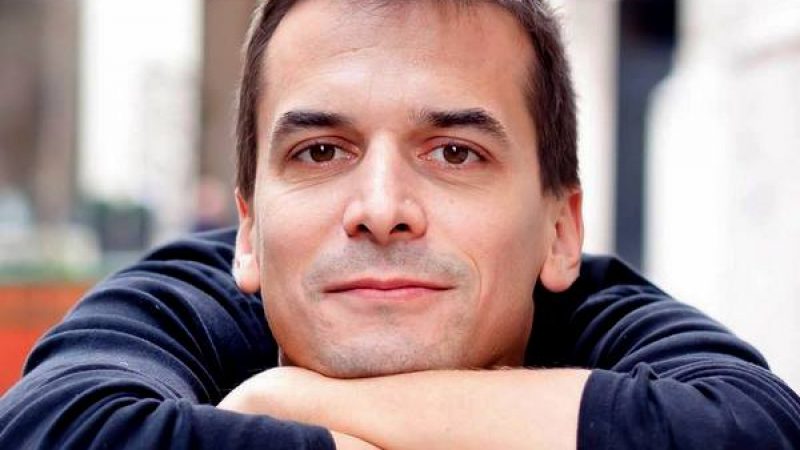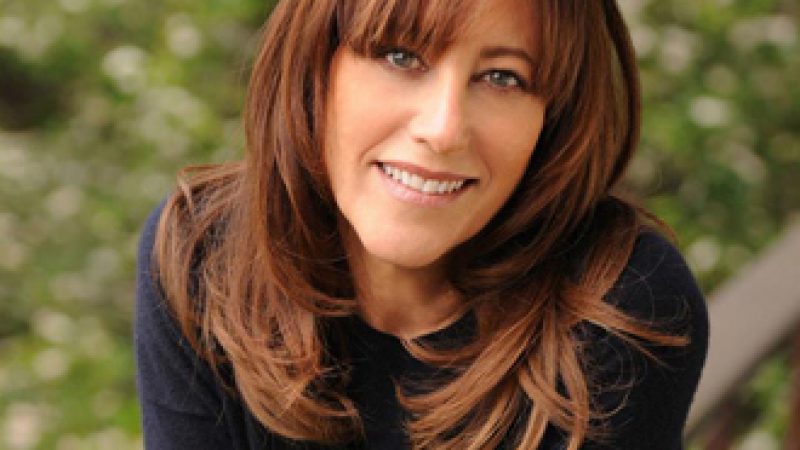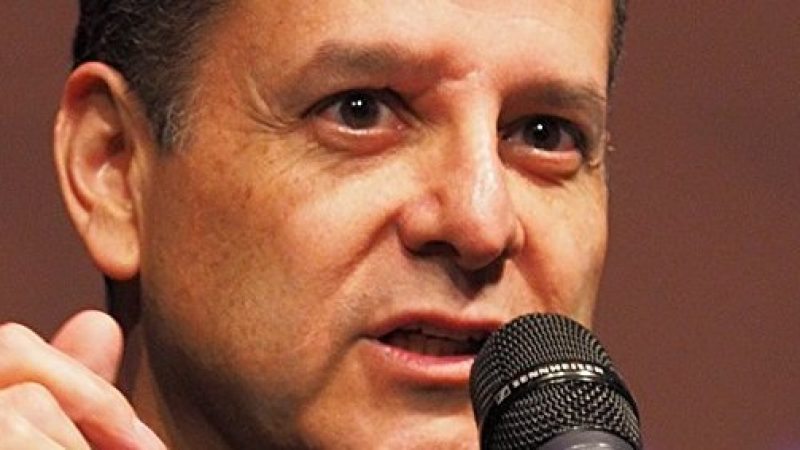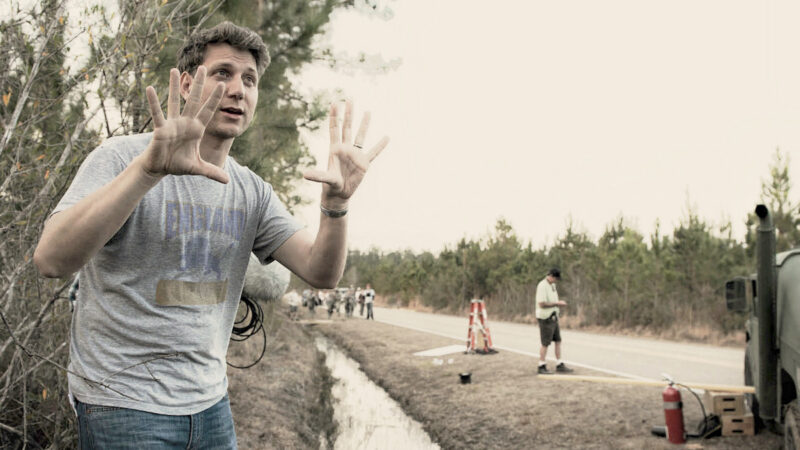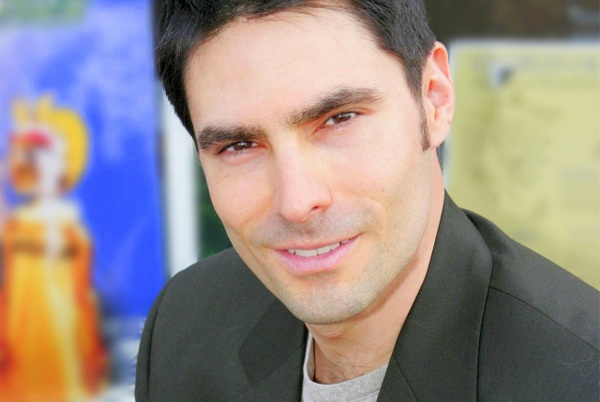
Eric Schumacher is a critically acclaimed Actor/Director/Producer with a rapidly growing fan base and a steadily growing list of successful film, local and national television, and multimedia projects under his belt. Raised by a family of actors, by the age of 6 Eric could be frequently found in Roxbury park in Los Angeles fencing with his father with plastic swords and reciting scenes from Hamlet. It’s been a lifelong passion.
After playing a wide range of challenging roles, on stage, Eric made a transition to film and began to gain a solid reputation in the industry and some positive attention from fans and critics alike. Eric is one of only a few individuals to have played both Wyatt Earp (Fox Tv’s Legends and Lies: the Real West) and Doc Holliday (Tombstone Rashomon directed by the legendary Alex Cox).
Other notable roles so far include Agent David Killjoy in the widely critically acclaimed sci fi series Zhon: The Alien Interviews (which he also co-produced with actor/fight choreographer Robert Linden) Frank Mann in the ground breaking comedy web series Crewing Up (now on DVD only), and his guest spots on the 13 season branded entertainment series The Bob and Angus Show produced by Seelie Studios.
Also a skilled director and producer, Eric later joined Seelie Studios as a partner and became the creative director for the organization. Many new projects which Eric either directed, produced or starred in are currently in production, post production or various phases of release, such as the upcoming 26 episode Seelie Studios sci-fi series My Stolen Time Machine and the award winning long form post-apocalyptic film/music video They Pretend, both of which Eric directed, and several feature films and short films in which Eric has principal roles.
Eric has been quoted in various publications about the film industry and lectures frequently at sci-fi conventions, comic-cons and film festivals.
Did you study what you do
I’ve studied acting since the time I was very young, 5 or 6 years old. First with my parents, both great actors and teachers. My mom is also a speech teacher for the actor specializing in dialects. Other mentors and teachers include the late Paul Mantee (Robinson Crusoe on Mars, Cagney and Lacy, Etc.), voice over coaches Susan McCullum and Jay Ginberg (both of whom have too many credits to mention), Lucille Bliss (the original Smurfette), Etc. I’ve taken a variety of workshops and long term classes. I also studied video production in school just long enough to start being offered gigs.
I learned the rest from mentors, individual study and on the job. I think it’s wise to see your training as an opportunity to learn and grow quickly and to take advantage of knowledge that others have gained. Good teachers can bring you up to speed on technique and philosophy, industry expectations; set etiquette, how to get work and many other things. They can also help you to zero in on your weaknesses and unintentional habits as an actor so that those things don’t kill you in an audition. As a producer or director, you need to understand the entire mechanism of making and marketing a film (it wouldn’t hurt you to have that knowledge as an actor either).
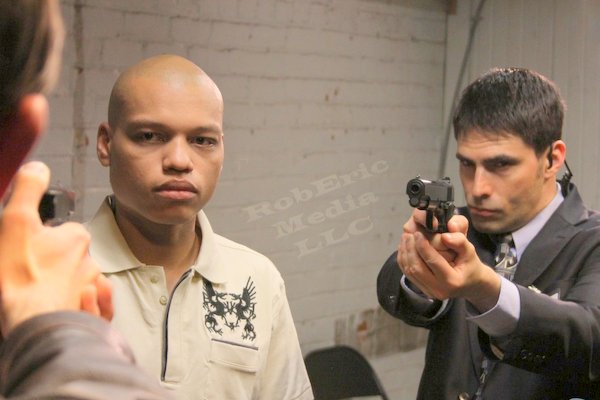
Eric Schumacher-Zhon-The Alien Interviews-Standoff Pictured with Robert Linden and Tyrel Good
You also need to understand leadership and you need to be able to place yourself in the shoes of every member of your team so you can effectively help them to work with you to get the results you want. It’s not all about you. You have a responsibility to everyone involved in your project to know what you’re doing and to give the project the best chance at being successful.
What is your filmmaking process
My acting technique comes largely out of full method, but really I’ve been exposed to many different techniques from many different schools of thought. You can’t really pin it down to one. I use whatever technique or set of techniques are the most effective for each particular role, making the process a living one but allowing me to benefit from the knowledge of many masters before me. As a director and producer, I have a basic process which is too extensive to explain here. Each project becomes its own animal however and I end up adapting that process as needed to each project’s unique needs.
Tell us about the work you have produced
As a producer/director, I’m most interested in new media. I feel that that’s the new frontier. I’ve produced or directed several web series a number of music videos, commercials (both TV and radio), and industrial videos and marketing videos, some audio only projects as well. Quite a few more projects are in the works right now including some feature films, one of which is in pre-production right now. That’s the short list anyway. The company I produce most of my projects under, Seelie Studios, LLC, produced a number of award winning projects under the leadership of my business partner producer/director Don Dehm before I joined. Their bread and butter has been multimedia so it was a great match
Do you take courses to improve your craft
As needed and as often as I can. I have coaches who help when I need another view into a character. I’m really busy so I don’t have time to take as many workshops as I’d like to. An actor should be constantly learning as should a director or producer. I teach periodically as well, usually one shot seminars at various fan or trade events upon request. I enjoy doing it.
How do you combine acting, producing and writing
Well I really enjoy being a part of the creative process from beginning to end. I guess the best answer is that one discipline often leads to the next if you have the skill sets to apply them. It’s hard to balance all of it since each discipline includes a lot of work. It’s important to know what your strengths are and when you need to bring in someone else to make sure things are done well. I’m about to do a project where I’ll direct myself and I’m frankly nervous about it. I really value the actor director relationship which is why I’ve avoided that up till now.
How did you get into the film business
I started auditioning for film and TV as a little kid. Kept at it and eventually studied video production so I could better understand all sides of the process. After awhile, found that I was being offered gigs for various positions behind the scenes also. Eventually I learned enough about that side of things that I felt competent to produce and direct and I started doing that to make sure that certain projects got done. As my reputation has grown both as an actor and a filmmaker, more opportunities have come my way. I’ve gotten the majority of my acting gigs through auditions and the majority of my client producing gigs by word of mouth reference so far, but more and more often I’m requested for a role without audition by someone who’s familiar with my work. In fact I just finished a wonderful project which I was cast in that way which should head to festivals later this year.
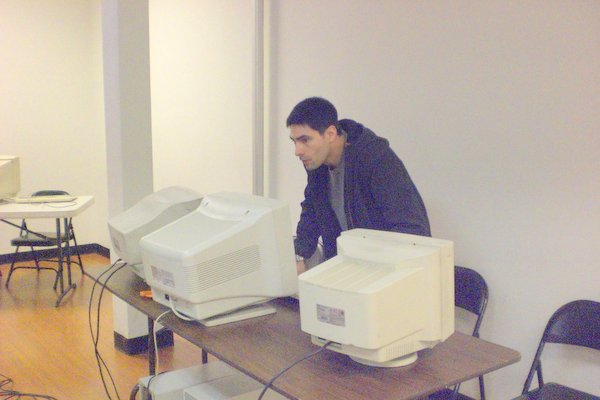
As Felix Bailey in Peter Leon’s sci fi feature film Forward
How do you turn an idea into a screenplay
I suggest you start by drafting a treatment (a long from summary of your story) and some character summaries and a few other documents that help you to describe specific elements of your project such as character summaries, and some backstory documents and a scene breakdown. From there, start writing the screenplay and be prepared to revise it a million times. I find it useful to work with writing teams to help with the rest of the development after the treatment is done.
Explain your writing process
Well it depends in part on what kind of the project it is. If it’s a project for a client, I research their industry and their needs and interview them a lot to gain context. Then I brainstorm concepts with them until they like the idea and then I give them a formal treatment, which, if approved leads to getting a team on board to hash the rest of it out. If the project is something more narrative fiction based that we create for our own release or to pitch to someone else, an idea will come to us and as quickly as possible I try to get an idea of what characters are involved in the storyline.
I find that the more quickly I understand the characters, the better I understand what will happen in the story and the concepts almost write themselves. Then I create the treatment and character summaries and send it to a writing team and discus intentions and brainstorm ideas. We then do some more out lines and assign certain script elements from within the team. Each draft is passed to other members of the team to review and comment on until it’s ready for me to review, and comment back, or, if I write a portion of the script, I send it to another member of the team to comment on and we work it through till everyone agrees it’s ready. When we run into a roadblock I take someone from the writing team or an actor friend and we improv the scenes with the characters. That usually helps us not only to discover the next moves in the storyline but also a lot of our best dialogue.
What tip can you give young writers
There are so many things I would like to say to young writers. I guess the three or four most important things are:
1. Seek to understand the way the business works and what the expectations are of you when submitting work as a professional writer (submission requirements, how to protect your work (copyright and Writers Guild registrations), a little bit about how films are made and budgetary ranges) and try to get an idea of what the industry looking for at any given moment,
2. Learn how to step back from your work and let go of your feeling of propriety. In particular learn how to take constructive criticism. I’ve seen a lot of work that’s just about ready for the market but the writer simply won’t make any changes to their “baby” no matter what,
3. Once you’re done writing your script look for what you can get rid of. After we finish a piece, I always try to go back through it and figure out what we can eliminate and still tell a story well. Writing a script is often the process of expanding your thoughts and then contracting them and then expanding and contracting again.
4. Make sure that you speak with a consistent voice and that you really understand your target audience.
Tell us about the directing work you have done
Most of my directing work has been in new media and in industrials and commercials. I’ve directed a number of creative marketing pieces for companies large and small. I directed a marketing piece for a multinational corporation that does some really good things in the world, a new science-fiction web series called My Stolen Time Machine which is in post production right now as I mentioned previously, an award-winning 11 minute post-apocalyptic music video for an African reggae/Afro Pop band called K-Bass And Farafina Musiki, and some of the opening sequences of a new adventure show called Department of Strange Finds starring my good friend, multiple Emmy award-winning action scientist and TV host Geoffrey Notkin. Lots more coming up.
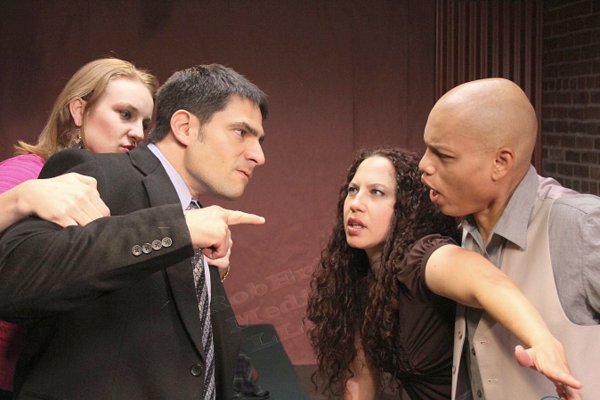
Zhon-The Alien Interviews-Amanda and Mindy Restrain David and Zhon-Pictured with Alida Gunn, Michele Holland, Robert Linden
What do you want to change about the film business
I’m not one of those independent filmmakers that bashes the major studios and claims that everything they put out is crap. That’s just not true. Many of the films released by the major companies are quality work which often sets the bar for everyone else and there are a lot of major franchises I hope to work on.
Independent filmmakers have it really tough right now, however, yet the work that many independent filmmakers do is very important and I think, necessary for the continued growth of the art. Independent filmmakers have the opportunity to innovate on a level that just isn’t possible for many major studios since so much is on the line at the big studios and there are so many layers of approval for each project to protect the bottom line.
In fact, independent filmmakers absolutely have to innovate in order to stand out. The problem is that most independents don’t have access to a large enough fanbase to monetize their projects and make a living at it. I want to make it easier for excellent independent projects to rise to the top and reach the audiences who will find them to be meaningful. I’m working on a new business plan with my partners to see if we can help with that a little.
What do you want to be remembered for
I want to be remembered for making art that makes people think and feel. Art that inspires audiences to find their best and to be their best. To imagine greater things and make them happen. To better understand themselves and their world. As an actor I want to be remembered for playing challenging roles that really connect with audiences and help them to build compassion with characters that perhaps they would never connect with otherwise.
For helping an audience to join the experience of a film vicariously. Films that become part of their mythology and that they will have passion for. As a director and producer I want to be remembered for creating projects that inspire people to be their very best, that challenge them to think differently about things and that become a part of our culture. I also want to be remembered for being honorable and kind to everyone I can, and for truly loving those who are close to me.
What do you want from an actor during production
I want actors that I am working with to hold themselves to the same standards to which I hold myself. When I’m directing I will do everything in my power to support and protect my actors, but I expect them to be professional, prepared, and to give everything they can to the audience and their fellow actors and crew. I expect them to bring their A game and to be collaborative.
To listen to direction and to work with me and their fellow actors to create something beautiful and dynamic. I don’t have time for slackers, but when I’m producing or directing and I can call the shots so to speak, I don’t tolerate disrespect to anyone on my set at any level. We are all in this together and we can either make a beautiful and important statement together in a way where we all feel honored and supported, or we can struggle to make something mediocre. I don’t do mediocre.
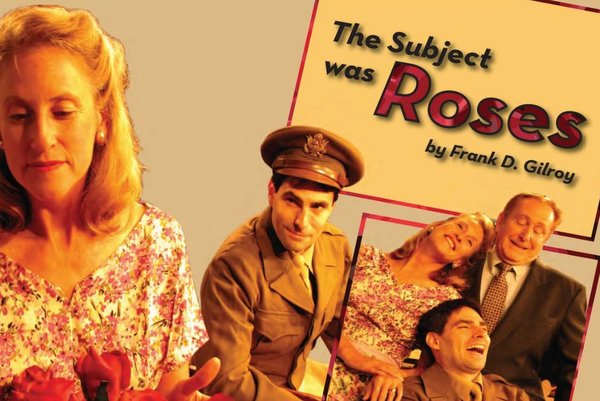
The subject was Roses by Frank D. Gilroy
What do you want from producer during production
Well first off there are a lot of different kind of producers. I’ll go with the standard definition of a true executive producer to answer this question. As an actor I will rarely have contact with the producer except to discuss logistics and that’s often handled by the assistant director or production manager.
I do enjoy meeting producers and getting to know then. They are often really incredible people who work intensely hard to make a production happen with very few accolades compared to the director and the actors. As a producer myself I respect their jobs and I’m in awe of producers who are better at it than I am. When I work as a director I see the producer as someone who is my direct boss and who is there to empower me and my team to realize our creative vision.
The best producers have my back and I have theirs and we work together to find the perfect balance between the creative vision and the practical.
What can a director do to get into the film industry
If you can afford film school that’s great. If you can’t afford it, and frankly even if you can, start volunteering on film sets and start apprenticing with people. Work your way up like everyone else. While you’re at it, ask directors who you believe are good at what they do if they will teach you, let you watch their process and let you assist.
Then Start directing. Start making small projects yourself, on your own dime if necessary and as soon as possible. There is no better way to learn then by doing. Just don’t expect everything you direct to be a masterpiece. When you start playing with other people’s money and when you start working with actors and film crews who are counting on you to put together a cohesive project, however, you’d better know what you’re doing. Make it clear to your team when it’s just a learning project and when it’s a professional endeavor. Read everything you can about the process and learn from other people.
When you think your projects are good enough, start submitting them for film festivals and network with people to build your reputation. I know one young director who started to make her films at… well she couldn’t have been older than 12. She showed real potential. Now at about 17 or 18 she’s about ready to go to film school and is planning to do that. She enters film school with more skill than a lot of people I know who have already graduated film school. I expect her to be the next great horror film director (the genre she prefers).
Who is your favorite director
I can’t possibly pick one. I’ve worked with some really brilliant people and there are a number of directors I hope to work with in the future. I do have to say that Alex Cox was on my bucket list to work with and he’s pretty much as awesome as you’d imagine. I’m going to limit my pick to someone who’s deceased and while I can’t really pick a very favorite I’ll go with Frank Capra.
Why
Capra created scenes and let his actors really unleash themselves after the drama was built. His films were meaningful and deep and withstand the test of time. I mean Mr. Smith Goes to Washington, It’s a wonderful Life…
What advice would you give to directors around the world
Knowing your way around a camera doesn’t make you a great director. Know your team, take courses on leadership. Understand actors and their process and the mindset of every person around you. Create a collaborative environment but never lose authority in the process. Be honorable and kind to your entire team and never ever take advantage of any of them and their trust in you.
Directing is a very, very difficult job and it should be. Delegate as much as you can and show trust in your team. You are the creative leader on your set, and therefore the set culture begins with you. If something goes wrong however, that’s also on you. It’s your job to oversee the set. And please, know your stuff. If you can’t earn the respect of your crew, things won’t go well.
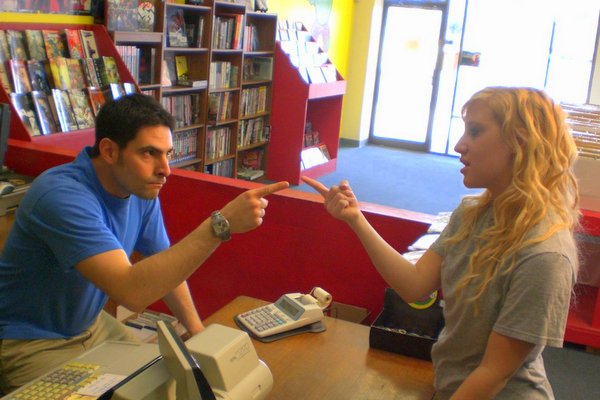
With Julie Schaffer (Sarah) on the set of Marty Ketola & Cliff Campbell’s Writing Fren-Zee a romantic comedy feature
Briefly write about your career
Before I made a hard shift to film and multimedia pretty much exclusively, I had the opportunity to play some really diverse and meaty roles in theater. I’ve been able to play leads or principal characters in slapstick comedies, heavy dramas, musicals; the works. Out of all of them, I guess I‘d have to say that my favorite to date was The Last Days Of Judas Iscariot. I played Yusef El-Fayoumy an undead Coptic Christian attorney prosecuting Judas Iscariot in a hearing in purgatory. It’s an amazing play and it was a truly potent cast and crew. The director, Eugenia Woods was off the charts. A master of her craft.
My favorite film role to date has to be Doc Holliday in the Alex Cox Film Tombstone Rashomon (soon to be released to film festivals all over). I really enjoyed playing a very unusual, badass DEA agent in a new crime drama series I’m not allowed to talk about yet (also to release soon) directed by my dear friend Alan Williams and produced with one of the most wonderful teams I’ve ever worked with. I loved playing newscaster Frank Mann in the groundbreaking but short lived web sitcom Crewing Up. I met my favorite horse Elvis on the set of Legends and Lies; the Real West for Fox TV, where I played Wyatt Earp. One of my toughest roles was as Agent David Killjoy in the Sci Fi Series Zhon: the Alien Interviews. Since I was co-producing I was doing double duty and it was really tough to do both jobs at the same time. My role as comic book store owner John Burns in the very micro budget feature film Writing Fren-Zee led me to some great relationships with folks who I have worked with many times since.
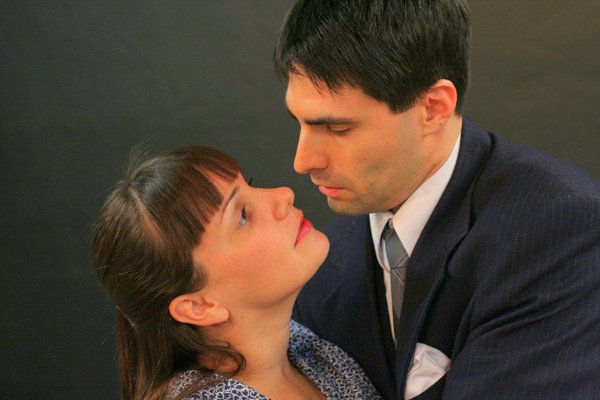
As Joe Farkus pictured with Holly Henderson (Sunny Freitag) In Live theater Workshop’s beloved Theater production of-The Last Night of Ballyhoo
In fact I’m co-starring in a sequel coming up soon. I just finished 2 wonderful short films and a promotional project playing a philosophical mild mannered family man (directed by Lucas Garvey), a nice guy who’s nearly killed by a murderous would be lover in the promotional trailer for a new book by Marina Martindale, and a crass, angsty fellow on a hunting trip with his buddies, which takes a very wrong turn (directed by Douglas Harms). I have another feature coming up shortly about the for profit prison system, currently titled From My Eyes. I play a ruthless business man in this well written drama. I occasionally get to flex my voice over muscles too. I’ve done national and local commercials and some really neat creative pieces. I have a special affinity for audio plays and audio books. As a director/Producer I’ve produced and/or directed tv commercials, music videos, web series, web promotional videos, and industrials.
I have to say as a director/producer, I love the casting process. While I expect a lot out of people who audition for me, we also try to create a welcoming environment where actors feel free to play and show us their unique approach to a character. You get to see so much talent at once and you never forget those moments when you offer someone a role and they burst into tears of joy. It’s awesome. As a director, I love the process of helping an actor to find the truth in their role and then guiding a technical team to capture it well. As to producing, I don’t enjoy much of it to be honest, but it’s necessary. It’s kind of an under sung job in the industry because most folks don’t know what a real producer does. To all of the great producers out there I love you. You deserve accolades.
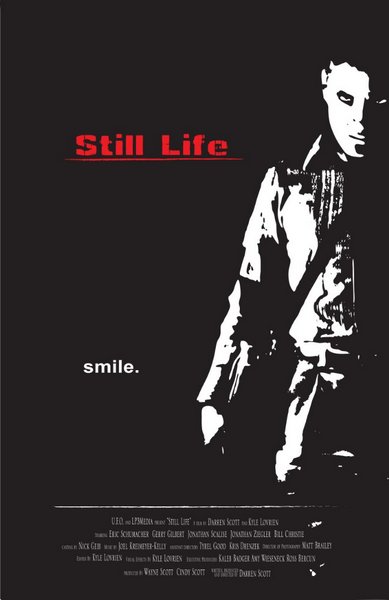
The poster for Still Life
INTERVIEWS
Director Amy Glazer Brings Kepler’s Dream to Life
An 11 year old searches for a missing rare book from her grandmother’s library
How I Made My Film, ‘Fear, Love & Agoraphobia’ by Alexander D’Lerma
A Step by Step Filmmaking Process of Fear, Love & Agoraphobia
The Key Facts Behind How Jeff Nichols Made The Indie Hit MUD
Jeff Nichols gives himself directorial challenges to master on every project.


